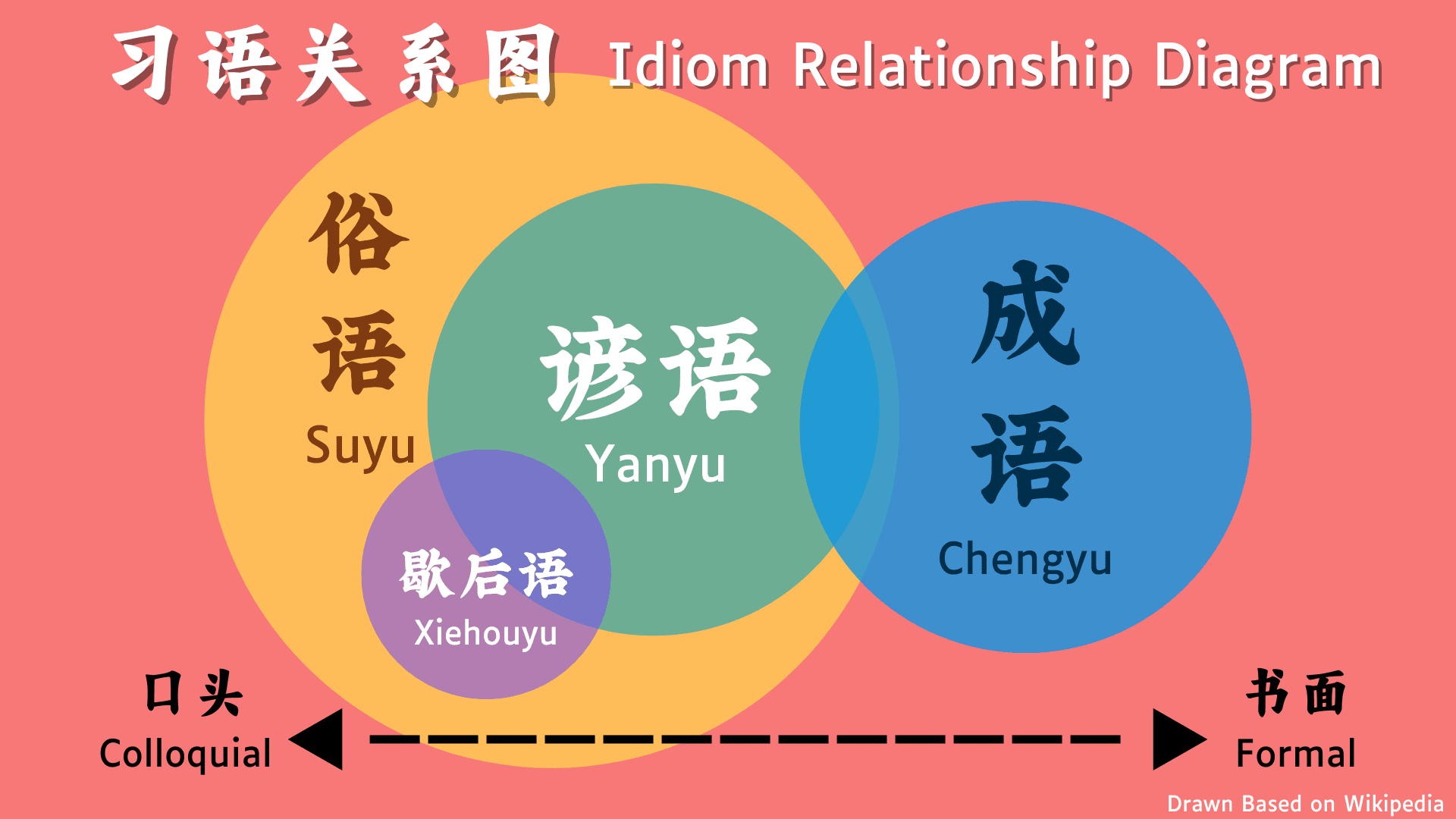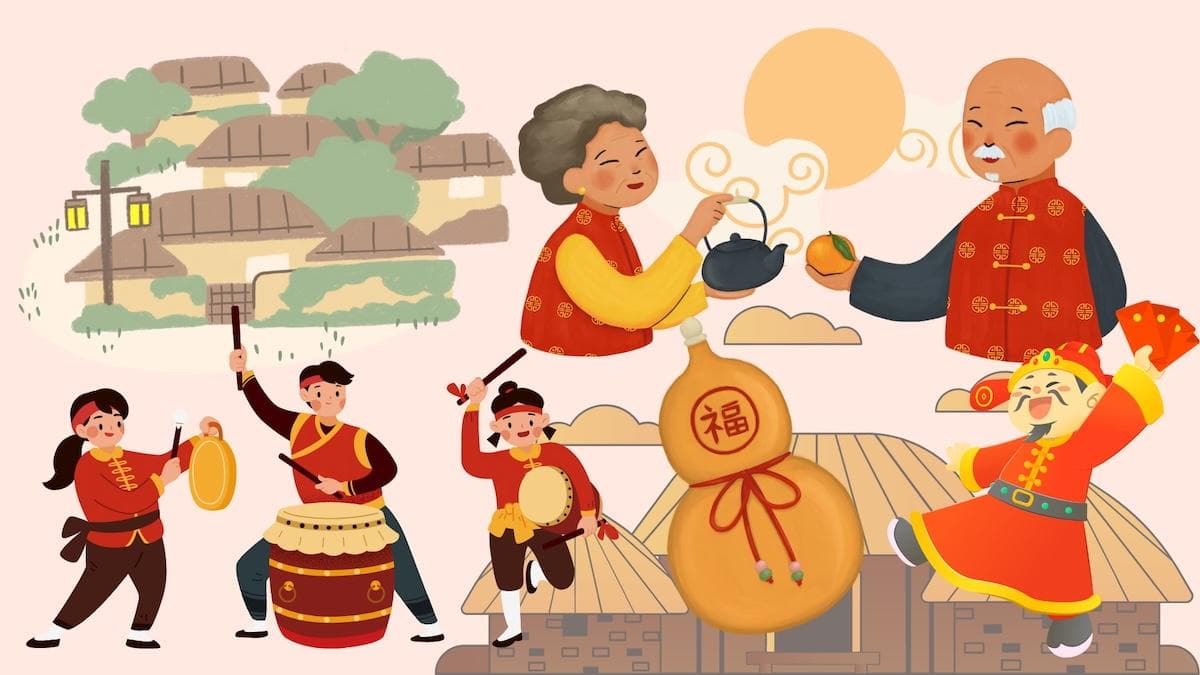In Chinese culture, folk wisdom finds expression through various forms of sayings, with súyǔ (俗语) and yànyǔ (谚语) being two important categories that share a special relationship. Understanding this relationship helps us appreciate how Chinese folk expressions work together to convey cultural wisdom.
Suyu vs. Yanyu – Relationship and Differences
In Chinese folk wisdom, 俗语 (Suyu) serves as a broad category that encompasses various colloquial expressions used in daily life. Within this broad category, 谚语 (Yanyu) holds a special place as a subset with its own distinct features. Unlike Suyu's often informal and regional tone, Yanyu expresses universal truths or moral lessons, making it more structured and generally applicable across regions. This relationship helps explain why Suyu and Yanyu are closely linked but not interchangeable: while Suyu includes many types of everyday sayings, Yanyu specifically embodies those that impart wisdom in a structured, almost aphoristic form. Recognizing this connection allows us to see how Chinese culture uses both everyday speech and formal expressions to convey values and advice.

Characteristics of Suyu (broad sense)
- Colloquial in nature
- Widely used in everyday speech
- Includes various types of folk expressions
- Can be region-specific
- Draws from both oral traditions and literary sources
- Reflects common people's experiences and aspirations
Characteristics of Yanyu
- More structured and complete in meaning
- Often contains explicit moral lessons or practical wisdom
- Passed down through generations
- Generally more fixed in form
- Usually expresses universal rather than regional truths
Examples
Suyu (narrow sense)
Colloquial expressions that are sometimes shorter and more direct:
- 不够塞牙缝的 (bù gòu sāi yá fèng de)
- Not enough to stuff a tooth gap
- Refers to a very small amount.
- 打肿脸充胖子 (dǎ zhǒng liǎn chōng pàng zi)
- To swell one's face to pretend to be fat
- Indicates putting up a front beyond one's means.
- 吃哑巴亏 (chī yǎ ba kuī)
- To suffer a loss silently
- Describes enduring hardship without being able to complain.
Yanyu (as part of broader Suyu)
Complete sayings that often express moral lessons or life wisdom:
- 不当家不知柴米贵 (bù dāng jiā bù zhī chái mǐ guì)
- Without running a household, one doesn't know the cost of rice and firewood
- Reflects the traditional value of responsibility, indicating that experience is the best teacher.
- 路遥知马力,日久见人心 (lù yáo zhī mǎ lì, rì jiǔ jiàn rén xīn)
- A long journey tests a horse's strength, time reveals a person's heart
- Suggests that true character is revealed over time.
- 有借有还,再借不难 (yǒu jiè yǒu huán, zài jiè bù nán)
- If you borrow and return, borrowing again won't be difficult
- Stresses the importance of credibility in relationships.
These expressions show how Yanyu, while part of the broader category of Suyu, maintains its own distinct characteristics with complete thoughts and clear moral lessons.
Historical Development
The term Suyu (俗语) first appeared in Records of the Grand Historian (《史记》), where it described popular sayings among the people. Throughout history, these expressions have been known by various names:
- 里言, 俚言, 乡言 (local sayings)
- 常言, 迩言, 恒言 (common sayings)
- 俗话, 常谈 (colloquial expressions)
- 街谈巷语 (street talk)

These various forms of expression have evolved to cover virtually every aspect of Chinese life and society. The endurance and variety of these sayings reflect their importance in Chinese culture, with each category addressing different aspects of human experience and wisdom.
Thematic Categories
Both Suyu and Yanyu cover various aspects of life, with distinct categories that reflect Chinese cultural values:
1. Social Wisdom
Teaching proper behavior and social relationships:
- 在家靠父母,出门靠朋友 (zài jiā kào fù mǔ, chū mén kào péng you)
- At home rely on parents, outside rely on friends
- Highlights the importance of both family and friendship.
- 远亲不如近邻 (yuǎn qīn bù rú jìn lín)
- A nearby neighbor is better than a distant relative
- Emphasizes valuing practical relationships over nominal ones.
2. Learning and Education
Emphasizing the importance of education:
- 活到老,学到老 (huó dào lǎo, xué dào lǎo)
- Live till old, learn till old
- Stresses the value of lifelong learning.
- 师傅领进门,修行在个人 (shī fu lǐng jìn mén, xiū xíng zài gè rén)
- The master can lead you to the door, but cultivation depends on yourself
- Highlights the role of personal effort in learning.
3. Life Experience
Practical wisdom from daily life:
- 挂羊头卖狗肉 (guà yáng tóu mài gǒu ròu)
- Hang up a sheep's head but sell dog meat
- Used to describe false advertising or deception.
- 便宜没好货,好货不便宜 (pián yi méi hǎo huò, hǎo huò bù pián yi)
- Cheap things aren't good, good things aren't cheap
- Implies that quality often comes at a cost.
Rhetorical Techniques
Both Suyu and Yanyu employ various rhetorical devices to make their messages memorable:
1. Metaphor
Using familiar objects to explain abstract concepts:
- 兵败如山倒 (bīng bài rú shān dǎo)
- An army's defeat is like a mountain collapsing
- A metaphor for a complete and devastating defeat.
2. Metonymy
Using associated concepts to represent ideas:
- 捡了芝麻,丢了西瓜 (jiǎn le zhī ma diū le xī guā)
- Picked up sesame seeds but lost the watermelon
- Used to describe the mistake of gaining something minor while losing something major.
3. Hyperbole
Deliberate exaggeration for effect:
- 人老骨头硬,铁打都不动 (rén lǎo gǔ tou yìng, tiě dǎ dōu bù dòng)
- The elderly's bones are so hard even iron can't move them
- Emphasizes the resilience of elderly people.
4. Parallelism
Balanced phrases with similar structure:
- 眼盲无畏虎豹,耳聋不怕火炮 (yǎn máng wú wèi hǔ bào, ěr lóng bù pà huǒ pào)
- The blind fear no tigers, the deaf fear no cannons
- Illustrates how ignorance leads to recklessness.
Learning and Using Suyu and Yanyu

1. Understand the Context
Understanding when and how to use these expressions is as important as knowing their meanings. Pay attention to how native speakers drop them into conversations - some are perfect for casual moments, while others fit better in formal settings. Notice which expressions are favored in specific contexts, such as business discussions, family gatherings, or social media. Regional variations can also affect usage, as some expressions may be more common or carry slightly different connotations in different parts of China.
2. Start with Common Examples
Begin with a handful of common expressions you'll likely hear daily. Focus on mastering these core phrases before branching out. Stick with the full versions to keep their meaning intact and watch how they blend seamlessly into daily life as you practice.
3. Pay Attention to Cultural Background
Every saying is a mini-window into Chinese culture and thinking. Understanding its roots - whether historical events, traditional values, or old wisdom - gives you insight into its full meaning. You'll soon see how these expressions reflect Chinese perspectives and how they stay relevant today.
The Enduring Value
These expressions remain vital parts of Chinese communication, offering:
- Efficient ways to express complex ideas
- Connection to traditional wisdom
- Practical guidance for modern life
- Cultural insights and understanding
The timelessness of Suyu and Yanyu lies in their ability to adapt to modern contexts. Today, these expressions are commonly seen in social media posts, advertisements, and even movies, showing their flexibility in conveying cultural messages. For example, a Yanyu about honesty or reliability might appear in a brand's marketing campaign to highlight its trustworthy reputation. Meanwhile, Suyu often finds humorous use in memes or online slang, capturing the experiences of modern life with age-old expressions. This enduring presence shows that while Chinese society has evolved, the wisdom contained within Suyu and Yanyu remains as relevant and engaging as ever. By learning and using these expressions, modern speakers can connect deeply with both traditional and contemporary aspects of Chinese culture.